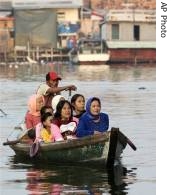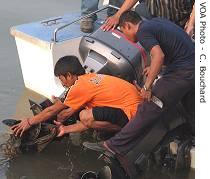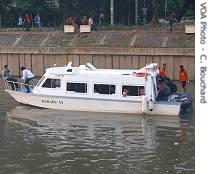-
(单词翻译:双击或拖选)
Jakarta
21 June 2007
The Indonesian capital of Jakarta does not often draw comparisons to the romantic Italian city of Venice. But city officials would like to change that. They are testing a water taxi service, something like the one in Venice, on one of Jakarta's notoriously polluted rivers. As Chad Bouchard reports from Jakarta, the officials are hoping the taxis will someday help ease traffic in the city and encourage residents to keep the waterways clean.
On a sunny Saturday afternoon, dozens of people wait at a small metal pier1 on the Ciliwung River for a ride in Jakarta 's first water taxi. Many have brought their kids for a family outing.

Muslim women dressed up for Eid, ride in a water taxi towards Sunda Kelapa harbor for Eid prayers in Jakarta (file photo)
The little 25-passenger, twin-outboard boat fills up fast. With a toot of its electronic horn, it swings confidently out into the current. A few minutes later, though, the motors fall silent. The left propeller2 is fouled3 with garbage, and has stopped turning.
As the boat begins drifting toward the concrete-lined riverbank, a worker tilts4 the motor up and pulls old clothes, plastic bags and nameless slime from the blades.
It takes a few tries, but the motor finally catches again.
|
|
| Jakarta's first water taxi, the Kerapu VI, was once used as a ferry among islands |
This first water taxi is more for amusement than serious transportation. It operates for only a few hours on weekends, and only makes a short loop on the river. However, the city hopes to add more boats to Jakarta's 13 waterways, and create an integrated commuter5 network that will offer an alternative to the roads.
An estimated four million vehicles clog6 Jakarta's roadways, and the demand for personal vehicles is growing 11 percent each year.
Between 500,000-600,000 people bring their cars into the city from outlying areas each day, contributing to pollution and traffic congestion7.
Using the city's canals to ease traffic is the brainchild of Jakarta Governor Sutioso, who hopes the waterways will become part of a mass transportation system over the next few years.
He says the waterway transport should be integrated with the city's bus routes, and connected to proposed subway and monorail lines. The new metropolitan8 system, he says, was designed by foreign consultants9, with the idea of expanding the system to outlying areas.
Water taxis are already a common and efficient means of everyday transport in other countries. The most famous are the vaporettos of Venice.
Closer to home, in the Thai capital of Bangkok, sometimes called "the Venice of the East" municipal river taxis and ferries carry an estimated 300,000 passengers every day.
Ainsley Jolley, a researcher at the Center for economic Studies at Victoria University in Australia, says that when road congestion reaches a critical mass, as it has in Bangkok, that is when people start to demand solutions.
"Sometimes, as the chaos10 grows worse, the political solutions become a little bit more palatable," said Jolley. "Rising living standards create stronger pressure groups that are likely to look more kindly11 on policies that will work, particularly demand for mass transit12."
Even if the water taxi program is implemented13, there is still that problem of the garbage clogging14 the waterways.
Environmental activists15 in Jakarta estimate the city produces 8,000 tons of trash per day. Public services like garbage collection are limited, so 15 percent of that waste ends up in the canals, and there is little effort to discourage it.
 |
| A worker clears garbage from the engine |
Back aboard the boat in Jakarta, a TV cameraman named Prastiyo is checking out the water taxi on his day off. He says he doubts Jakartans will ditch their beloved cars or motorbikes anytime soon, and the trash in the water is one of the main reasons for his skepticism.
He says people will choose land transportation instead of a water taxi because there are a lot of problems, like the garbage that fouled the boat's propeller. He also says the boat is slower than a bus or a regular taxi.
Homemaker Evi Servianti is more enthusiastic about the idea. She thinks boats could provide a pleasant alternative to Jakarta's infamous16 traffic jams. And, like city leaders, she believes the water taxis could inspire people to take better care of the rivers and canals.
She says for the city to clean up, people will have to learn not to throw garbage around. If people who ride the canal boats become more aware of the pollution problems, she says, maybe others will be more conscientious17.
As if to illustrate18 the challenge, a little girl on the water taxi tosses a plastic cup into the water. There is a lot of work to be done before the waterways are clean. To paraphrase19 the old saying, Venice was not built in a day.
 收听单词发音
收听单词发音
1
pier

|
|
| n.码头;桥墩,桥柱;[建]窗间壁,支柱 | |
参考例句: |
|
|
|
2
propeller

|
|
| n.螺旋桨,推进器 | |
参考例句: |
|
|
|
3
fouled

|
|
| v.使污秽( foul的过去式和过去分词 );弄脏;击球出界;(通常用废物)弄脏 | |
参考例句: |
|
|
|
4
tilts

|
|
| (意欲赢得某物或战胜某人的)企图,尝试( tilt的名词复数 ) | |
参考例句: |
|
|
|
5
commuter

|
|
| n.(尤指市郊之间)乘公交车辆上下班者 | |
参考例句: |
|
|
|
6
clog

|
|
| vt.塞满,阻塞;n.[常pl.]木屐 | |
参考例句: |
|
|
|
7
congestion

|
|
| n.阻塞,消化不良 | |
参考例句: |
|
|
|
8
metropolitan

|
|
| adj.大城市的,大都会的 | |
参考例句: |
|
|
|
9
consultants

|
|
| 顾问( consultant的名词复数 ); 高级顾问医生,会诊医生 | |
参考例句: |
|
|
|
10
chaos

|
|
| n.混乱,无秩序 | |
参考例句: |
|
|
|
11
kindly

|
|
| adj.和蔼的,温和的,爽快的;adv.温和地,亲切地 | |
参考例句: |
|
|
|
12
transit

|
|
| n.经过,运输;vt.穿越,旋转;vi.越过 | |
参考例句: |
|
|
|
13
implemented

|
|
| v.实现( implement的过去式和过去分词 );执行;贯彻;使生效 | |
参考例句: |
|
|
|
14
clogging

|
|
| 堵塞,闭合 | |
参考例句: |
|
|
|
15
activists

|
|
| n.(政治活动的)积极分子,活动家( activist的名词复数 ) | |
参考例句: |
|
|
|
16
infamous

|
|
| adj.声名狼藉的,臭名昭著的,邪恶的 | |
参考例句: |
|
|
|
17
conscientious

|
|
| adj.审慎正直的,认真的,本着良心的 | |
参考例句: |
|
|
|
18
illustrate

|
|
| v.举例说明,阐明;图解,加插图 | |
参考例句: |
|
|
|
19
paraphrase

|
|
| vt.将…释义,改写;n.释义,意义 | |
参考例句: |
|
|
|
















